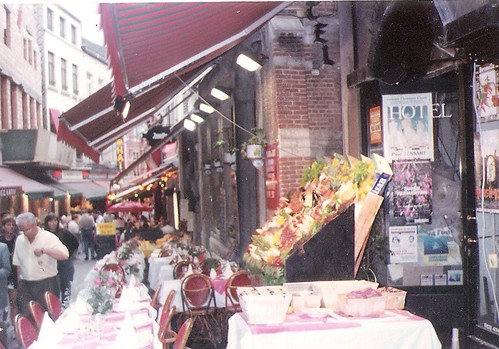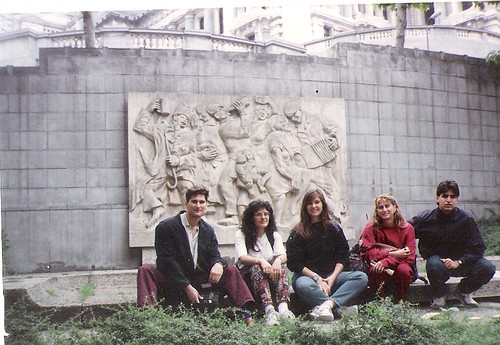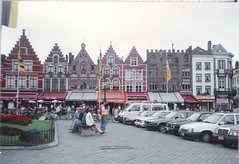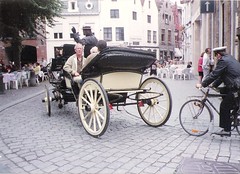After the shock of Paris, I made my way through more organised and often quite picturesque places in Northern Europe.
Friday 12/7/91 - 5.10pm BRUSSELS: Another nice train trip (Eurocity trains are such good value), another big, old, beautiful city. Staying at the Jacques Brel youth hostel. Bought a collection of his songs on CD - my first ever CD purchase! - at a huge shopping mall. Passed by a monument dedicated to the unknown soldier with an ever-burning fire: quite poignant, as it feels that the war happened only recently. Lovely fountains in the city - looks like there are hundreds of them. Quite a commercial area, many shops near the Grand Place, which is like a huge piazza surrounded by lots of old buildings. Had an interesting chat with the shop owner. Had to pry myself away - he was showing too much interest in me.
Now I'm sitting in front of the youth hostel in the place des Barricades. Very hot during the day, quite cool at night. This place is quite expensive: 3 nights for 1000BF, just as much as the CD cost me. Bread and cheese, a few postcards and some stamps have set me back by another 300BF. Minus the CD, that's 1300BF= ₤22.
Saturday 13/7/91 - 3.25pm BRUSSELS: Slept well in my sleeping bag - beats paying for sheets. Sharing a room with 5 Spaniards from Vigo-Galicia - I got a top bunk. They told me to visit Ghent. The breakfast was very filling, one of the best hostel breakfasts I've had so far on the trip. Shame I won't be able to have some tomorrow morning, as I depart on a very early train for Bruges.
 Sunday 14/7/91 - 2.45pm BRUGES: Bruges is much more colourful than Ghent. It has that pretty postcard look to it, but it's very crowded. The architecture has been preserved very well and the canals weaving through it make it look like a little Venice. Ave Maria (Our Lady) statues - people must be quite religious in this area. Now sitting in the Grote Markt, looking out at the Belfry chiming away. Europeans love their bell-ringing; it's like a hobby for them. As I left the area, I came across a woman wearing traditional costume, sitting outside a shop selling traditional crafts. She was making lace. Quaint.
Sunday 14/7/91 - 2.45pm BRUGES: Bruges is much more colourful than Ghent. It has that pretty postcard look to it, but it's very crowded. The architecture has been preserved very well and the canals weaving through it make it look like a little Venice. Ave Maria (Our Lady) statues - people must be quite religious in this area. Now sitting in the Grote Markt, looking out at the Belfry chiming away. Europeans love their bell-ringing; it's like a hobby for them. As I left the area, I came across a woman wearing traditional costume, sitting outside a shop selling traditional crafts. She was making lace. Quaint.

 Bruges is probably the most picturesque town I've visited so far. (I'm pretending I can't smell the horse manure all over the place from the horse-and-carriage tourist transport.) But it makes me wonder what these European cities survive on. All they sell is pretty looks. There doesn't seem to be anything else happening here, other than looking at pretty old buildings. Cute sightseeing, great place to walk around in. That's it. Charming Flanders country for good photography sessions. Interestingly, no biligualism apparent here in the street signs - all signs were in Flemish.
Bruges is probably the most picturesque town I've visited so far. (I'm pretending I can't smell the horse manure all over the place from the horse-and-carriage tourist transport.) But it makes me wonder what these European cities survive on. All they sell is pretty looks. There doesn't seem to be anything else happening here, other than looking at pretty old buildings. Cute sightseeing, great place to walk around in. That's it. Charming Flanders country for good photography sessions. Interestingly, no biligualism apparent here in the street signs - all signs were in Flemish.
Met up with a Canadian and we're on our way to the youth hostel. She's got open train tickets too and she's suggested Strasbourg for tomorrow. We can pay a little extra for a sleeper wagon. Don't know how I feel about going back into French territory after Paris. We'll see.
Friday 12/7/91 - 5.10pm BRUSSELS: Another nice train trip (Eurocity trains are such good value), another big, old, beautiful city. Staying at the Jacques Brel youth hostel. Bought a collection of his songs on CD - my first ever CD purchase! - at a huge shopping mall. Passed by a monument dedicated to the unknown soldier with an ever-burning fire: quite poignant, as it feels that the war happened only recently. Lovely fountains in the city - looks like there are hundreds of them. Quite a commercial area, many shops near the Grand Place, which is like a huge piazza surrounded by lots of old buildings. Had an interesting chat with the shop owner. Had to pry myself away - he was showing too much interest in me.
A typical 1991 scene in the centre of Brussels: a bit of French-style cafe culture combined with the promising EEC (as the EU was then known) spirit that was being cultivated in the city given its role as host of the EU headquarters.
Now I'm sitting in front of the youth hostel in the place des Barricades. Very hot during the day, quite cool at night. This place is quite expensive: 3 nights for 1000BF, just as much as the CD cost me. Bread and cheese, a few postcards and some stamps have set me back by another 300BF. Minus the CD, that's 1300BF= ₤22.
Saturday 13/7/91 - 3.25pm BRUSSELS: Slept well in my sleeping bag - beats paying for sheets. Sharing a room with 5 Spaniards from Vigo-Galicia - I got a top bunk. They told me to visit Ghent. The breakfast was very filling, one of the best hostel breakfasts I've had so far on the trip. Shame I won't be able to have some tomorrow morning, as I depart on a very early train for Bruges.
 |
| The Acropolis of Brussels - Manneken Pis |
Took a guided walking tour around Brussels today. Manneken Pis was treated as the highlight of the tour. But the walk was good value in other ways. Mainly young university graduates on the tour, touring through Europe in a similar way to myself. Met a Greek from Finland (from Chios). During the walk, we passed by a few Greek restaurants. The guide told me that Greeks are mainly in the restaurant business here. Came back to the youth hostel early because it's been raining steadily all day - I should have had a brolly with me! Washing clothes at the moment in a launderette close to the youth hostel. Will visit the EEC centre later in the afternoon with some of the people I met on the walking tour. Bought some frites for lunch - 40BF.
Cambios de change - they charge very high commission rates for changing money. No way to avoid it: I change currencies as often as I change country, which is every three or four days at this rate.
Sunday 14/7/91 - 12.30pm GHENT: I have a cold. No wonder; it IS cold. Decided to try out Ghent on my way to Bruges - Eurail tickets let you hop on and off trains on the same day. Ghent is quiet and picturesque, but the weather is absolutely miserable - it's cold, cloudy and drizzling. That's what mid-July summer weather is supposedly like in Northern Europe: cold. This is supposed to be a bustling university town - a lot of young people walking about. Tried to find an information centre, but they were all closed. Walked about a bit, and got a little lost. I ended up at a flower market - nice sea of colours against the backdrop of a dull sky. While getting waylaid, I passed by some old but very pretty buildings, quite a few luscious green spaces, a lily pond and what looked like the university. Was hoping to visit the castle the Spaniards told me about, but I couldn't hack the rain any longer. The drizzle is so fine it doesn't feel like it's raining, but eventually, you feel your clothes are wet. Wearing a plastic raincoat doesn't help - you can feel the humidity.
Waiting on the platform for a train to Bruges. "I came, I saw, I went." It just occurred to me that I haven't had much to eat today. If only I could find some more of those delicious frites I had in Brussels. Found a pizza and salad place near the station: 165BF. I really needed that sustenance!
 Sunday 14/7/91 - 2.45pm BRUGES: Bruges is much more colourful than Ghent. It has that pretty postcard look to it, but it's very crowded. The architecture has been preserved very well and the canals weaving through it make it look like a little Venice. Ave Maria (Our Lady) statues - people must be quite religious in this area. Now sitting in the Grote Markt, looking out at the Belfry chiming away. Europeans love their bell-ringing; it's like a hobby for them. As I left the area, I came across a woman wearing traditional costume, sitting outside a shop selling traditional crafts. She was making lace. Quaint.
Sunday 14/7/91 - 2.45pm BRUGES: Bruges is much more colourful than Ghent. It has that pretty postcard look to it, but it's very crowded. The architecture has been preserved very well and the canals weaving through it make it look like a little Venice. Ave Maria (Our Lady) statues - people must be quite religious in this area. Now sitting in the Grote Markt, looking out at the Belfry chiming away. Europeans love their bell-ringing; it's like a hobby for them. As I left the area, I came across a woman wearing traditional costume, sitting outside a shop selling traditional crafts. She was making lace. Quaint.
"I came, I saw, I went" - my travels through Northern Europe in 1991 could be summarised by this sentence. As I search the web for more information on the same towns, I find out that Manneken Pis has a huge wardrobe, Ghent's weather is generally cloudy all year round, and Bruges has been granted protection as a UNESCO World Heritage Site, for similar reasons to those of the Acropolis in Athens. (The large photos are my own from my 1991 trip; the smaller photos come from internet sites, showing the exact same scenes two decades later.)

 Bruges is probably the most picturesque town I've visited so far. (I'm pretending I can't smell the horse manure all over the place from the horse-and-carriage tourist transport.) But it makes me wonder what these European cities survive on. All they sell is pretty looks. There doesn't seem to be anything else happening here, other than looking at pretty old buildings. Cute sightseeing, great place to walk around in. That's it. Charming Flanders country for good photography sessions. Interestingly, no biligualism apparent here in the street signs - all signs were in Flemish.
Bruges is probably the most picturesque town I've visited so far. (I'm pretending I can't smell the horse manure all over the place from the horse-and-carriage tourist transport.) But it makes me wonder what these European cities survive on. All they sell is pretty looks. There doesn't seem to be anything else happening here, other than looking at pretty old buildings. Cute sightseeing, great place to walk around in. That's it. Charming Flanders country for good photography sessions. Interestingly, no biligualism apparent here in the street signs - all signs were in Flemish.Met up with a Canadian and we're on our way to the youth hostel. She's got open train tickets too and she's suggested Strasbourg for tomorrow. We can pay a little extra for a sleeper wagon. Don't know how I feel about going back into French territory after Paris. We'll see.
(to be continued)
*** *** ***
Looking back on my 1991 photos of Europe, when she was in her heyday so to speak, given her rising importance in world politics and economics at that time, it's quite obvious why she's now gone stagnant. Europe has a lot of culture to sell, something people don't need in their daily lives to survive: at any rate, modern people create their own culture. What people need is worthwhile and productive work in order to provide them with food and shelter. The climatic conditions of Northern Europe even make it difficult to feed the population without imports. A sustainable lifestyle is hindered in such situations.
Someone provides something for someone else to possess or use. But what one country provides to the other is seen in unequal terms. How can it be equal when the conditions are not the same? The climate, food and lifestyle of Greece cannot be compared to that of Northern Europe. Neither can an office job in a centrally heated building and an outdoor job tilling fields and sowing crops. We continue to seek what we don't have; we rarely value what we do have. Europe's in trouble and she knows it, like a sinking ship. Can she reconcile her vast differences amicably? Not from what we hear and read.
Someone provides something for someone else to possess or use. But what one country provides to the other is seen in unequal terms. How can it be equal when the conditions are not the same? The climate, food and lifestyle of Greece cannot be compared to that of Northern Europe. Neither can an office job in a centrally heated building and an outdoor job tilling fields and sowing crops. We continue to seek what we don't have; we rarely value what we do have. Europe's in trouble and she knows it, like a sinking ship. Can she reconcile her vast differences amicably? Not from what we hear and read.
©All Rights Reserved/Organically cooked. No part of this blog may be
reproduced and/or copied by any means without prior consent from Maria
Verivaki.







As fas as I can remember in Western Europe summer lasts mid June to mid July. That's why we came back. Better poor in Greece than putting up with all that rain. Which reminds that I have to move to the lowlands soon.
ReplyDelete